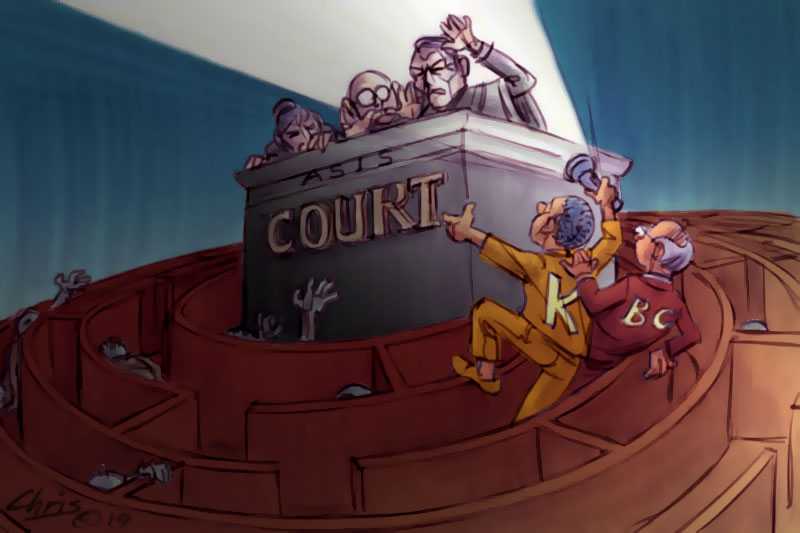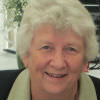Kafka in Australia: the trial of Witness K
Franz Kafka's book The Trial is a waking nightmare. Josef K, a bank clerk, is arrested. He is never charged, and no evidence of wrongdoing is ever revealed. For the next 12 months he undergoes a series of encounters with strange people, hearing insinuations and veiled accusations.
 The narrative is filled with a sense of suffocation, like the airless rooms from which he longs to escape. He confronts the psychological weapons of suspicion, concealment and pressure being used against him, but gradually becomes more and more a willing victim, ultimately passive as he walks to his death. He succumbs to the oppression of a system which presses down on him by unexplained laws and the constant threat of an invisible but sleepless court.
The narrative is filled with a sense of suffocation, like the airless rooms from which he longs to escape. He confronts the psychological weapons of suspicion, concealment and pressure being used against him, but gradually becomes more and more a willing victim, ultimately passive as he walks to his death. He succumbs to the oppression of a system which presses down on him by unexplained laws and the constant threat of an invisible but sleepless court.
Although written in 1914 before the rise of the 20th century totalitarian regimes, the book's foreboding atmosphere is a fitting herald of those dehumanising systems. 'Kafkaesque' seems such clever adjective, as though we can look back to a flawed age, and sail above the soulless system that demolished Josef K. How very wrong we are. Our own chilling version of The Trial is being played out under our very noses, in the matter of 'Witness K' and his lawyer Bernard Collaery. The similarities do not end with names. In an appalling doubling, the pursuit of Josef K is mirrored in the prosecution of Witness K.
Witness K and Collaery have been charged with making known Australian state secrets in connection with the spying on Timor-Leste undertaken by the Australian Secret Intelligence Service (ASIS) in 2004. Under the guise of an AusAid program, operatives bugged the walls of the Timorese prime minister's offices and listened to negotiators' planning sessions. Australia thus duped the Timorese into signing the 2006 treaty governing the split of the revenues of a section of the Timor Sea.
One of the spies, now known as Witness K, became aware that high Australian officials involved in the spying were lobbying for Woodside, an Australian oil company with interest in the area. Witness K pursued ASIS's internal processes and was advised to get a lawyer, engaging Collaery.
Once the fact of the spying was clear, the Timorese took Australia to the International Court of Justice. Both Collaery's and Witness K's premises were raided and papers seized. K's passport was taken, thus preventing him from testifying at the Hague. Meanwhile, the Timorese revoked the treaty and began negotiations for a border with Australia, which (after Australia had exhausted every avenue of opposition) was signed in March 2018. Two months later, Witness K and Collaery were charged with offences against the Intelligence Services Act of 2001.
The nightmare is gathering momentum. As in Kafka's story, a parody of a proper trial is being played out, with secrecy, postponements, months-long delays, and late delivery of documents frustrating the process. And all this concerns merely the preliminary hearings. The two men and their families are demeaned: 'innocent people are humiliated in front of crowds rather than being given a proper trial', as Kafka writes.
The Attorney-General has issued a non-disclosure certificate designed to prevent information likely to prejudice national security from being disclosed in court. So information connected to the unethical pursuit of wealth at the expense of a smaller and weaker partner is now dressed up as 'national security'.
In the interests of that security the defendants have not received the brief of evidence against them, and it is possible that the court case, in whole or in part, could be conducted in their absence. Kafka writes: '... but K should not forget that the trial would not be public ... the accused and his defence don't have access even to the court records, and especially not to the indictment ...'
Yet what is at stake is not some threat to Australians, but knowledge of the fraud committed by the government of Australia on the Timorese, and rightful public pursuit of those who ordered the illegal spying. Kafka's hero mused in hope that 'those who were really guilty, the high officials whom nobody had so far dared point out to him, received their punishment'.
Kafka's dark tale appears hopeless. But that is a state into which those who know the story of Witness K and Bernard Collaery refuse to descend. Australians have the responsibility to oppose the erosion of the fair trial process which is underway. The Attorney-General has the power to discontinue the case. He should do so immediately.
 Susan Connelly, a Sister of St Joseph, has been involved in education as a primary school teacher and principal, and has also taught scripture in state schools full-time for ten years. She has had extensive involvement with the Timorese people, mainly in cultural pursuits and justice advocacy.
Susan Connelly, a Sister of St Joseph, has been involved in education as a primary school teacher and principal, and has also taught scripture in state schools full-time for ten years. She has had extensive involvement with the Timorese people, mainly in cultural pursuits and justice advocacy.
Bernard Collaery will be launching Professor Clinton Fernandes's book Island off the Coast of Asia on Saturday 13 April 2019, 3-5 pm at Monte Sant' Angelo College, 128 Miller Street, North Sydney. Free event.
https://www.eurekastreet.com.au/article/kafka-in-australia--the-trial-of-witness-k?utm_medium=email&utm_campaign=Eureka+Street+Daily+-+Monday+8+April+2019&utm_content=Eureka+Street+Daily+-+Monday+8+April+2019+CID_678a802cec9e0f431925716ed72fa937&utm_source=Jescom+Newsletters&utm_term=READ+MORE&fbclid=IwAR3OpzjfB3cs-nSKukJE79qsgRqkZc-OufL-_BLbeHu7ol8LVHqNfoCPjpk

0 Comments:
Post a Comment
Subscribe to Post Comments [Atom]
<< Home